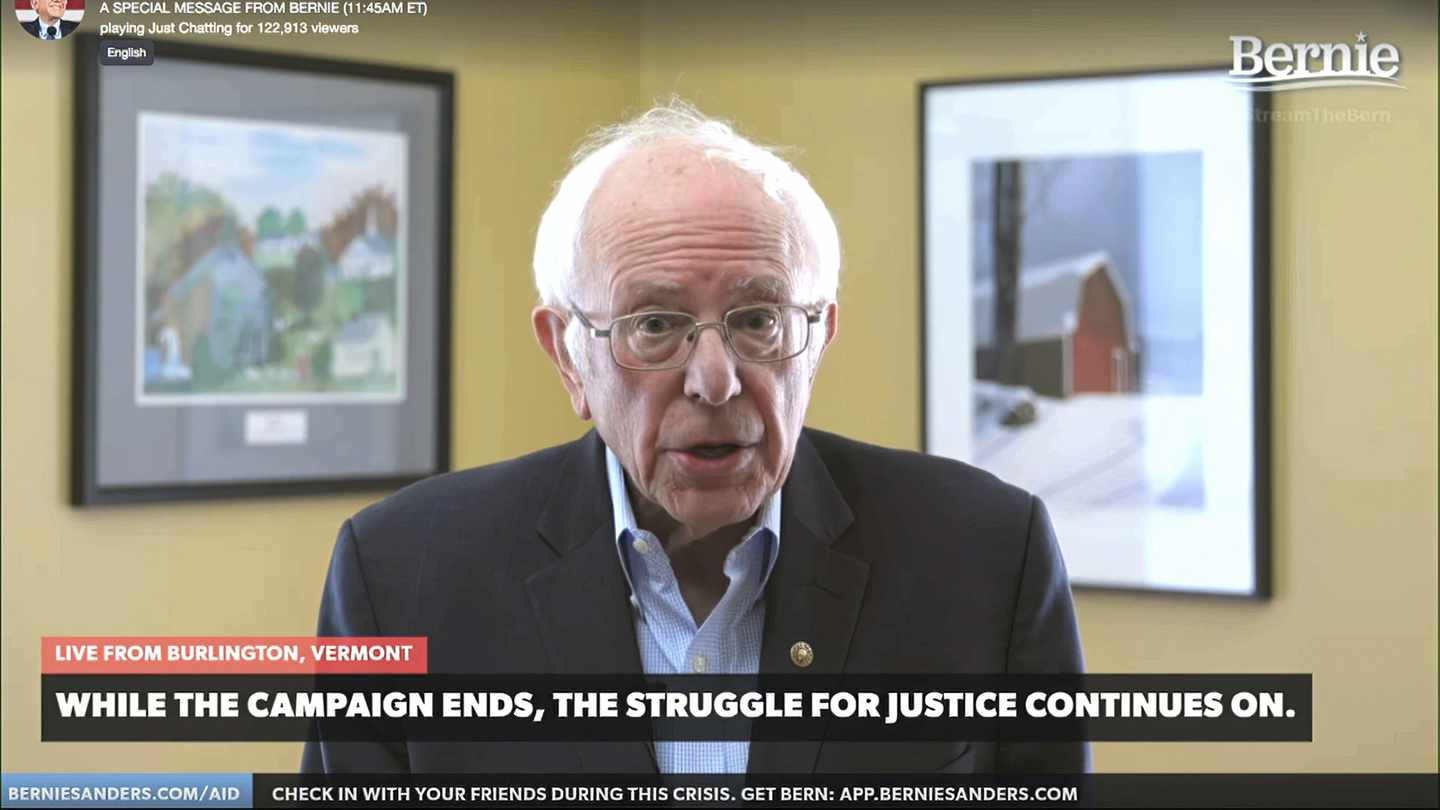Bernie Lost, But COVID-19 Made His Point
April 8, 2020#election2020 #BernieSanders #Coronavirus #COVID-19

At real and needless risk to their lives, Democrats who voted in person in Wisconsin on Tuesday sent a message to Sen. Bernie Sanders: get out of the race. At noon on Wednesday, he did just that.
The Wisconsin primary was a scary event that former Vice President Joe Biden quietly – but very much – wanted to happen, the risk of going to the polls aside. His team thought they should highlight the obvious case that, by some logistical means, he will be the party’s nominee – and that Bernie should join a unified front against a political virus named Donald Trump.
The advent of COVID-19, which some (including me) initially thought might help Sanders by stopping the nominating process in its tracks, has had the opposite effect. Biden is barely visible politically now, obscured by President Trump’s frighteningly strange Tiger King Show in the press room. Bernie Sanders, fourth or fifth fiddle at best (counting Speaker Pelosi, Leader McConnell and others), disappeared altogether.
This was not just as matter of media mechanics. There simply is no appetite now for sweeping philosophical arguments. The pandemic has made the leadership character of the president – or lack of it – not just the central issue, but the only issue, to voters of every stripe. Most Republicans still love Trump, but Democrats now see him not just as a threat to the Constitution and the rule of law, but to their actual ability to breathe.
Bernie voters told me that they loved his consistency and unshakable commitment. His main campaign slogan, which I saw plastered on every balcony of every rally, was “Not me. Us.” He talked in every paragraph of every speech about how Americans should be responsible to and for one another, and how government’s role is to make that happen. This was the 2020s, he admitted, but we were in a new -- and new kind -- of Great Depression. We therefore needed a New-New Deal much broader than the first.
As was true in 2016, it became clear that Sanders could not make a winning case for his socialist views in our personality-driven politics. He was doing great, especially with young, disaffected white voters, until a broader swath of Democratic voters looked more closely at him on Super Tuesday. What they saw (or wanted, or were made to see) was a shouting, arm-waving, 1930s newsreel Agitator of the People who was nearing 80 and yet still an admirer of jungle revolutionaries in Latin America.
But if Bernie has lost the nomination, he has won the argument. COVID-19 has made it for him. The pandemic has turned us all semi- socialists.
Cowboy Individualism is inspiring and uniquely American. It’s a blessing that it is in our DNA. But the pandemic makes it clear, even to greed-is-good Wall Street suits – especially to those who live in New York City – that the “collectivism” they hate can also be the only way to save the human race and global economy and America’s health and wealth in particular.
Bernie was right when he said, as he always did on the trail, that we are at a hinge point in history and that the country needs a political revolution.
And now even most conservative, libertarian-minded Republicans have publicly tossed aside their claimed objection to Big Government. They have supported and voted for massive new spending on basic income support, health care and more, and probably will do so again in the near future.
The Bible Belt base of the GOP, founded by Ronald Reagan and now Trump’s bedrock, is having its fervid faith literally tested by the urgent need for well-funded science, and by a virus that is running rampant through the region.
Medicare for All might not make it in the form Sanders envisions, but the need for a more organized, a more adept and more equitable health care system is clear.
We will inevitably face a fiscal reckoning over how to account for the trillions of dollars we’re spending to try to save the American and global economies. That, in turn, will raise the urgency of Bernie’s argument about the need for a more evenhanded distribution of the federal tax burden.
Younger voters are especially keen to have government muster a greater sense of cooperation as we face the existential threat posed by climate change. Does that mean enactment of the Green New Deal, as championed by Sanders in its mind-boggling entirety? No. But the virus has changed the context, and forced instinctively insular Americans to think bigger and more globally.
At a more prosaic level, accumulated acts of social-distancing and shared concern add up to a society acknowledging Sanders’ underlying point about “Us.”
It would be naive and wrong to assume that those whom Sanders would call the “reactionaries” won’t try to deny that they have made any concessions whatsoever to the idea that government-led answers are necessary answers.
But we are not going back to where we were. If nothing else, it’s bad medicine.
Source: https://www.realclearpolitics.com/

